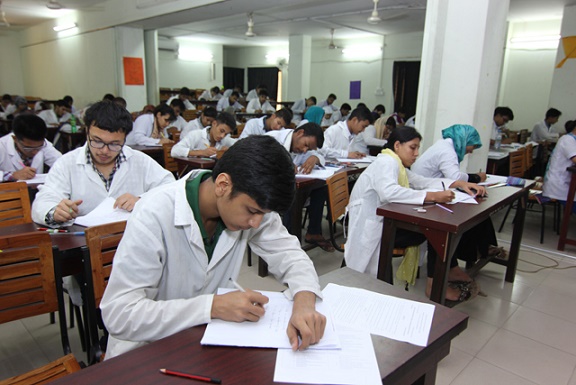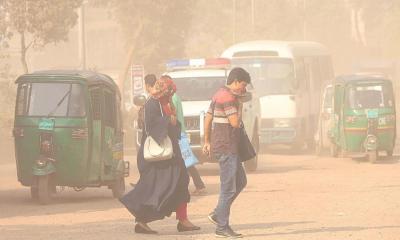- Nepalese & Indian students decreasing in BD
-Huge lack of teachers, medical equipment, laboratory amenities
-BD is not recognized in WFME
-70 percent professorships vacancy in basic subjects
Ministry of Health is approving the opening of medical colleges one by one without guaranteeing physical infrastructure, educational equipment and manpower. However, government medical colleges are facing various crises including lack of teachers and teaching materials. There is no proper monitoring of the quality of health education. The concerned persons think that this crisis will intensify by opening new medical facilities without solving these problems.
In such a situation, the quality of the new doctors who are coming is lacking. On the one hand, the acceptance of the country's MBBS degree holders in the outside world is decreasing; on the other hand, the attraction of foreign students to study in this country is also decreasing.
Many people concerned said that the number of foreign students is decreasing due to the lack of recognition by the World Federation for Medical Education (WFME), which works on medical education and training of doctors worldwide, and is lagging behind in competition with neighboring countries.They said MBBS degree of Bangladesh will lose acceptance in many countries of the world if WFME is not recognized.
Even if they can work in the country, doctors cannot go abroad, can't get any job abroad, can't go to study, and can’t participate in any training program. Foreign students coming to study in Bangladesh may stop completely at some point. Because after studying here, they will not be able to go abroad to work or get a higher degree.
According to the information of the Bureau of Health Education, a total of 221 seats (reserved quota) have been kept for foreign students in the government medical colleges of the country.
Among them, there are 117 seats for students from SAARC countries and 99 seats for other countries. There are five seats reserved by the Bangladesh government. Apart from this, two thousand 551 seats have been reserved for foreign students in total 66 private medical colleges of the country as 45 percent.
Professor Dr. Mozaherul Haque , former senior consultant of World Federation for Medical Education (WFME) and World Health Organization (WHO) former advisor on Southeast Asia said that shortage of teachers, laboratory facilities, shortage of medical equipment for training and lack of monitoring and supervision as per standards – these are the main reasons. That is why Bangladesh is still lagging behind in achieving WFME accreditation.
Like there are many medical colleges, which have hospitals, but not many patients for hands-on training, no medical laboratory facilities or testing equipment, due to which the outside world has a perception about us, that the medical colleges here are of low quality.
Mozaherul Haque said that Bangladesh Medical and Dental Council (BM&DC) is responsible for looking at the quality of health education in the country. Apart from this, two other authorities are the University and the Ministry of Health. Due to these three parties taking responsibility, the quality of medical education is not really being controlled. What is needed here is responsibility and accountability. The government needs to clearly identify who is responsible. Those who want to see the quality of health education in medical colleges or universities. Monitor through regular inspections. Disciplinary action should be taken against those who do not follow the management policy. Those who do well should be rewarded. It should be remembered that it is better not to produce poor quality doctors.
In this regard, Health and Family Welfare Minister Dr. Samant Lal Sen said, 'We have started working to get WFME accreditation. A committee has also been formed. Hopefully, I will be able to achieve my WFME accreditation very soon.'
Dr. Samant Lal Sen said, "I often say one thing, it is important to be good people and good quality doctors rather than increasing the number of doctors." We have given special emphasis on that.
Prof. Bayezid Khurshid Riaz, Additional Director General (Administration) of the Department of Health Education, in a conference of medical principals of Cox's Bazar, presented the information about the situation of teachers in 37 medical in last February. It is said that there are two thousand and five posts of professors, associate professors, assistant professors, curators and lecturers in eight basic subjects in the medical colleges of the country. There are no teachers in 588 of these posts. In other words, medical education programs are running across the country without an average of 29 percent teachers in basic subjects.
Among these teachers, professors are ahead in experience and skills. But there is a shortage of professors across the country. There are 213 posts of professors in basic subjects in government medical colleges, 65 are working. In other words, 70 percent of the professorships in basic subjects are vacant.
As per rules, the number of part-time teachers in any department of a private medical college or dental college cannot be kept more than 25 percent of the sanctioned posts of the concerned department. At least 50 students should be admitted in these colleges. At least two acres of land should be available in metropolitan areas for setting up private medical colleges and one acre for dental colleges. In other areas, the amount of this land should be four acres and two acres. A medical college or a dental college and a hospital managed under it shall not be set up in any leased or rented land or building.
On the condition of anonymity, an official of the Department of Health Education said that the latest report being prepared on private medical colleges, where 80 percent of institutions are not fully complying with the policy. Among them, about 30 percent failed to comply with the policy.
Except for a few private medical colleges, most of them do not have enough necessary infrastructure, teachers, teaching materials, high-quality laboratories, hands-on teaching facilities for students. As a result, the competence of the doctors passed from them has been questioned, the report mentioned.
The Director General of the Department of Health and Education Professor Dr Md Tito Mia said that the admission of foreign students has not yet started this year. Application process is ongoing. About 1 thousand 700 applications have been submitted in private. Last year about 2,300 foreign students were admitted. As such, their rate can be said to have decreased by about 30 percent.
Dr Md Tito Mia said the reason for the decrease in foreign students is the increase in the number of private medical schools in India and Nepal. The students from these two countries who came to study medical in Bangladesh earlier were the most. Apart from this they have reduced the tuition fees by half. As earlier it used to cost around Tk1 crore to study in private medical in India, now they have reduced the cost to Tk50 lakh. Along with this, the lack of WFME recognition is also a reason for the decrease in foreign students in our country. India, Nepal and China have received this recognition. We are also working on it. The Council has already All in all; Bangladesh has fallen behind in the competitive market.
ZH






